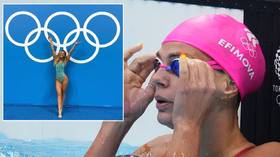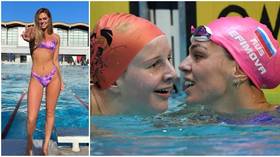‘Money decides everything’: Russian swim star Efimova bemoans early start times at ‘dishonest’ Tokyo Olympics

Russian breaststroke queen Yulia Efimova has hit out at the early start times for the swimming finals at the Tokyo Olympics, also venting her frustrations about some of the restrictions athletes face in Japan.
Competing at what are likely to be her last Olympic Games, Efimova booked a spot in the 100m breaststroke final by finishing third in her semi-final on Monday.
Joining her will be countrywoman Evgeniya Chikunova, 16, who came home fourth in the same race.
Both will bid for a medal in Tuesday’s final, which gets underway at 11.17 am local time in Tokyo.
The morning start is in keeping with all the showpiece swimming events in Japan, in a concession to US broadcasters which can show them at more auspicious night-time slots for their audiences Stateside.
Efimova, though, has bemoaned the start times as not being conducive to athletes recording their best times.
“It’s really tough. But the results say the same in all the distances [in the pool],” Efimova told the Russian media.
“All the more so when yesterday evening we finished late, and today we have to get up early in the morning.
“Usually all the training is in the morning, and before the Olympics you plan for that.
"All the same, in the morning results don’t go like they should. But everyone’s facing the same conditions.”
Broadcaster NBC shelled out a reported $7.75 billion back in 2014 for exclusive rights to show the sporting spectacular in the US until the 2032 Games, meaning TV bosses get a considerable say in how events are scheduled.
“Unfortunately, in our world, money is everything, and they don't pay attention to the interests of athletes,” added Efimova.
“We would have seen better results if the finals were held in the evening. World records would be broken. But this is also interesting [with morning finals], because the unpredictability increases.”
Officials at the International Olympic Committee (IOC) responded to the complaints by telling Russian media that it was “not the first time” they had heard grumbles, but said athletes had to respect the demand of broadcasters, and could also benefit as a result.
Six-time world champion Efimova, 29, is chasing a fourth Olympic medal after bagging bronze in the 200m breaststroke in London and two silver medals – in the 100m and 200m – in the pool in Rio in 2016.
However, the social media favorite suggested that the Covid-hit Games in Tokyo were far from the joyous Olympic spirit witnessed at previous editions of the event.
“The [Olympic] village is like a village. It’s small, and we can’t do anything,” Efimova said of her time between races.
“The rooms are like in the rest of the Olympics. The only thing is that the sizes in Japan are smaller. There’s only one dining room.
"What annoys me the most is the gift shop that you can't go to. And if you come in, there’s already nothing left. I’d like to take home some souvenirs.
“I’m upset that it’s impossible to go anywhere, a lot of athletes are suspended from the competition. This is already a dishonest Olympics, when not everyone can compete.”
Efimova’s third-placed semi-final finish means she won’t be among the favorites to reach the podium in Tokyo, with America’s Lilly King – a double gold medalist in Rio – and South Africa’s Tatjana Schoenmaker both hotly fancied.
Efimova has some history with King, with the pair doing battle in Rio while trading barbs along the way.
“I’m a fan of Tanja Schoenmaker. If I don't win myself, then let Tanja win,” said Efimova of Tuesday’s final at the Tokyo Aquatics Center.
She added, however, that the field was very much open.
“In general, the ending will be unpredictable. Especially because the race is in the morning. Plus everything is always different at the Olympics.
"Anyone can win, from first to eighth place.”














